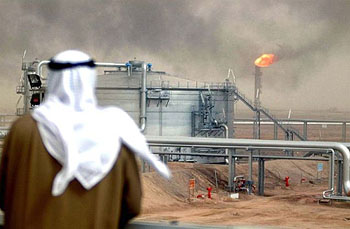The Guardian reports today on another WikiLeaks cable, this time about oil production in Saudi Arabia. Based on conversations with Sadad al-Husseini, a geologist and former head of exploration at Aramco, the Saudi state oil company, the U.S. consul general thinks the Saudis have  been significantly overstating both the size of their reserves and their production capacity:
been significantly overstating both the size of their reserves and their production capacity:
The cables, released by WikiLeaks, urge Washington to take seriously a warning from a senior Saudi government oil executive that the kingdom’s crude oil reserves may have been overstated by as much as 300bn barrels — nearly 40%….According to the cables, which date between 2007-09, Husseini said Saudi Arabia might reach an output of 12m barrels a day in 10 years but before then — possibly as early as 2012 — global oil production would have hit its highest point. This crunch point is known as “peak oil”.
….The US consul then told Washington: “While al-Husseini fundamentally contradicts the Aramco company line, he is no doomsday theorist. His pedigree, experience and outlook demand that his predictions be thoughtfully considered.”….While fears of premature “peak oil” and Saudi production problems had been expressed before, no US official has come close to saying this in public.
This won’t come as a surprise to anyone who’s been following the oil industry over the past few years. Matthew Simmons’ Twilight in the Desert, which I reviewed six years ago, made a detailed case that Saudi Arabia’s production capacity had pretty much maxed out already, and Business Week published an article three years ago based on internal Saudi documents that said much the same: the Saudis could pump 12 million barrels a day in short spurts but only 10 million barrels on a steady basis — and that’s all there is. Production capacity just isn’t going up.
There’s always Iraq, of course, which certainly has more production capacity if it can develop it, but Saudi Arabia increasingly looks like it’s peaked already. And if that’s true, it probably means that the global peak in production, which was delayed a few years by the 2008 recession, is most likely not too far away. Our future is going to be increasingly oil free whether we like it or not.



















